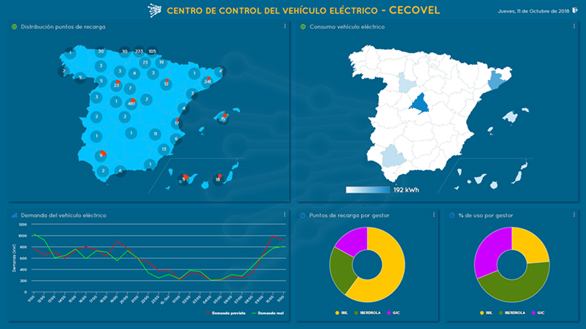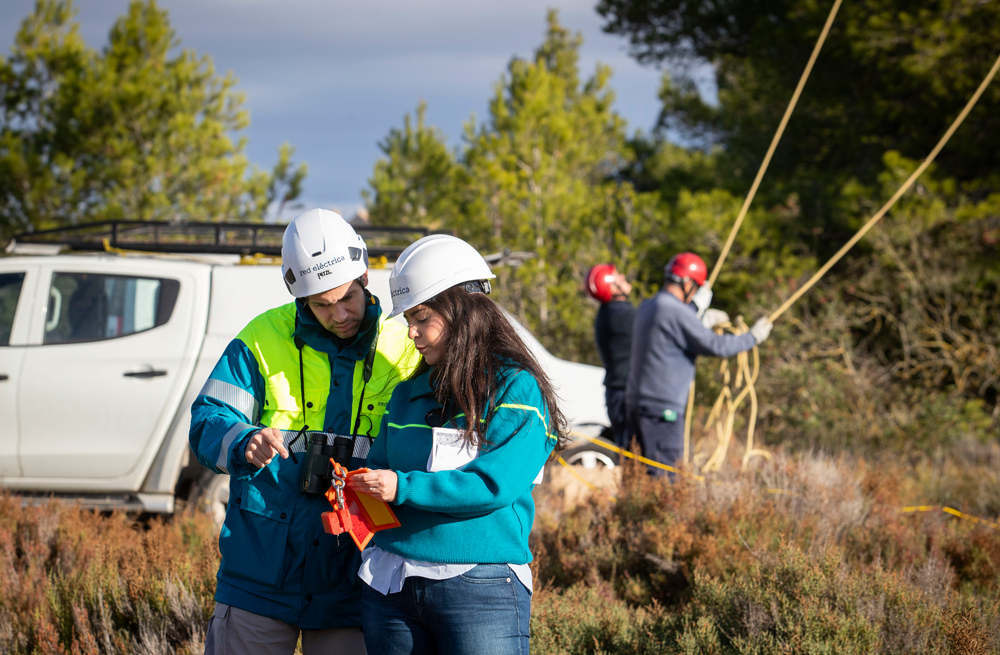Discover what Red Eléctrica is, what we do, and why we are the backbone of the electricity system in Spain and the ecological transition.
Red Eléctrica joins the sustainable mobility challenge aimed at promoting the use of electric cars in municipalities and facilitating the installation of public charging points
- The Company signs a collaboration agreement with the Spanish Federation of Municipalities and Provinces (FEMP) to offer technical assistance in the field of electric mobility.
- The Spanish electricity system is prepared to integrate the electric vehicles expected during the energy transition.
- REE makes the Control Centre for the Electric Vehicle (CECOVEL) available to city councils in order to facilitate the smart management of charging points.
Red Eléctrica de España (REE) joins the commitment to sustainable mobility and signs a collaboration agreement with the Spanish Federation of Municipalities and Provinces (FEMP) to provide technical assistance to the local councils, promote the use of the electric car throughout the territory and facilitate the installation of public charging points in cities and municipalities. In this way, the Company chaired by Jordi Sevilla confirms its commitment to the transition towards a decarbonised energy model, a path that will allow us to meet European targets and achieve the urban mobility goals defined by the Spanish Government in the future Law on Climate Change.
The agreement with FEMP sets out four courses of action: the exchange of experiences in the field of electric mobility, technical assistance in this area, support for the training of the staff of the local councils for the promotion of mobility, energy efficiency and the development of renewable energy, and, lastly, collaboration on the smart management of the charging points in the municipalities through the Control Centre for the Electric Car (CECOVEL). Through this agreement, REE has made the CECOVEL available to city councils to facilitate the deployment of public charging points nationwide.
According to the Chairman of Red Eléctrica, Jordi Sevilla, "our commitment to electric mobility is firm, that is why we want to contribute to launching initiatives that help develop the necessary infrastructures and favour their deployment throughout the towns and cities of our country". As of 2019, REE will advise FEMP on the preparation of a document of terms & conditions that will enable the Federation's contracting authority to tender a framework agreement for local entities that wish to acquire smart charging points.
At present there are 4,800 public charging points in Spain. The estimate is for this figure to grow to 90,000 (including those installed in urban areas and on road networks) in five years; up to 100,000 in ten years, and reach 120,000 in fifteen years. "The network of public charging points must be developed extensively in order to generate trust among citizens and thus favour the purchase of electric cars," stressed Mr. Sevilla.
The electricity system is prepared to manage the integration of the electric car
During the presentation of the collaboration agreement with FEMP, Jordi Sevilla also referred to the capacity of the Spanish electricity system to manage the integration of a fully electric vehicle fleet. "The European Union’s Clean Energy Package places the consumer at the heart of the electricity system and our obligation is to provide a reliable response to the charging needs".
In this regard, the President of FEMP, Abel Caballero, stressed that "the Spanish Federation of Municipalities and Provinces is the key driving force in order for electric mobility, sustainable mobility, to reach all citizens quickly and with absolute efficiency through the 8,124 local councils". Mr. Caballero, who once again stated that his commitment to electric mobility is absolute, said "in fact in Vigo, in my city council, the official vehicles are electric", and pointed out that "if FEMP is the key driving force, the tool that allows it to be put into practice with a faultless management is our Contracting Centre, to which almost 1,200 local entities are affiliated and which is the best intermediary between Red Eléctrica, in this case, and the local administrations and all their /charging points.” Currently, less than 1% of the vehicle fleet in Spain is sustainable and the forecasts are that in 2050 it will have been totally reconverted, with the presence of 24 million electric vehicles. "From the perspective of generation and transmission, the electricity system is ready for the integration of the electric vehicles that are expected during the energy transition," said Miguel Duvison, General Manager of System Operation Division. In fact, "for every million new electric vehicles that are incorporated, the electricity demand would increase by around 1%. Something totally within the capability of the system, "he concluded.
In order for the integration of the electric vehicle into the electricity system to be carried out safely and efficiently, Red Eléctrica has implemented the Control Centre for the Electric Vehicle (CECOVEL), a pioneering project in Spain and Europe, and the first of its kind developed by a TSO. The CECOVEL is now an integral component of the Control Centre of Renewable Energies (CECRE).
The Control Centre of the Electric Vehicle is a collaborative project established with the main mobility players in Spain – IBIL, GIC and soon FENIE – which currently integrates nearly 1,000 georeferenced charging points. With the new collaboration agreement and the consequent connection of the additional charging points that already exist in the municipalities, CECOVEL becomes an essential tool to promote electric mobility and may send instructions for action to the local councils, favouring a more efficient charge management.

The expansion of the electric vehicle fleet is a key element to favour the reduction of pollution in cities and the reduction of direct CO2 emissions, and thus improving air quality in urban areas. The arrival of a million electric cars would represent a reduction of 1.1Mt per year, equivalent to 1.3% of all emissions from road transport. In this way, in 2050 with 100% renewable generation, these emissions, both direct and indirect, would be zero.
For the Chairman of Red Eléctrica, Jordi Sevilla, "the penetration of the electric car, combined with the decarbonisation of the generation mix, is the best strategy to reduce emissions from the transport sector, which in Spain is the activity with the highest volume of greenhouse gas emissions, reaching 35% of the national GHG emissions".
The Press Office of Red Eléctrica publishes all written and audio-visual information via the Twitter account @RedElectricaREE.
Also, on Facebook through the account RedElectricaREE.










